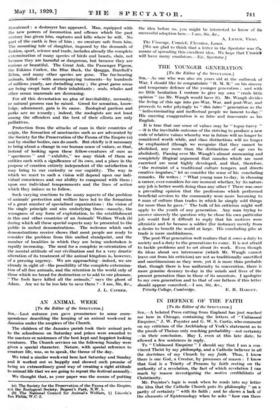THE YOUNGER GENERATION
[To the Editor of the SPECTATOR.] Su;,—As one who was also six years old at the outbreak of War, I should like to congratulate " R. M. B." on his sincere and temperate defence of the younger generation ; and with no little hesitation I venture to give my own " crude little opinion " (as Mr. Waugh would have it). Mr. Waugh divides the living of this age into pre-War, War, and post-War, and proceeds to refer pityingly to " this latter " generation as the " indiscriminating and ineffectual people we lament to-day." His sneering exaggeration is as false and inaccurate as his English.
It is true that our sense of values may be " topsy-turvy " —it is the inevitable outcome of the striving to produce a new code of relative values whereby war in future will no longer be considered worth while, and class distinctions will no longer be emphasized (though we recognize that they cannot be abolished, any more than the distinctions of age can be abolished). Passing over Mr. Waugh's almost unmeaning and completely illogical argument that muscles which are most exercised are most highly developed, and that, therefore, " the restraint of a traditional culture tempers and directs creative impulses," let us consider the sense of his concluding remarks. He writes : " What young man to-day, in choosing a career, ever considers for one moment whether, by its nature, any job is better worth doing than any other ? There was once a prevailing opinion that the professions which performed beneficial services to the community were more becoming to a man of culture than trades in which he simply sold things for more than he gave." The bulk of his criticism might well apply to the youth of any generation. Any man trying to answer sincerely the question why he chose his own particular job would find it difficult to reply that his motives were altruistic and he became a soldier (for instance) merely from a desire to benefit the world at large. His concluding gibe at trade is mere snobbishness.
The post-War generation well realizes that it owes a duty to society and a duty to the generations to come. It is not afraid to tackle problems and to set about its work. Even though its ideas about sex intercourse (which Mr. Waugh cannot leave out from his criticism) are not as traditionally sanctified and sanctimonious as they were, yet it is more than probable that, though there is less uniformity to convention, there is more genuine decency to-day in the minds and lives of the present generation than in those of its ancestors. I apologize to my own generation and to that of our fathers if this letter should appear conceited.—I am, Sir, &c.,










































 Previous page
Previous page